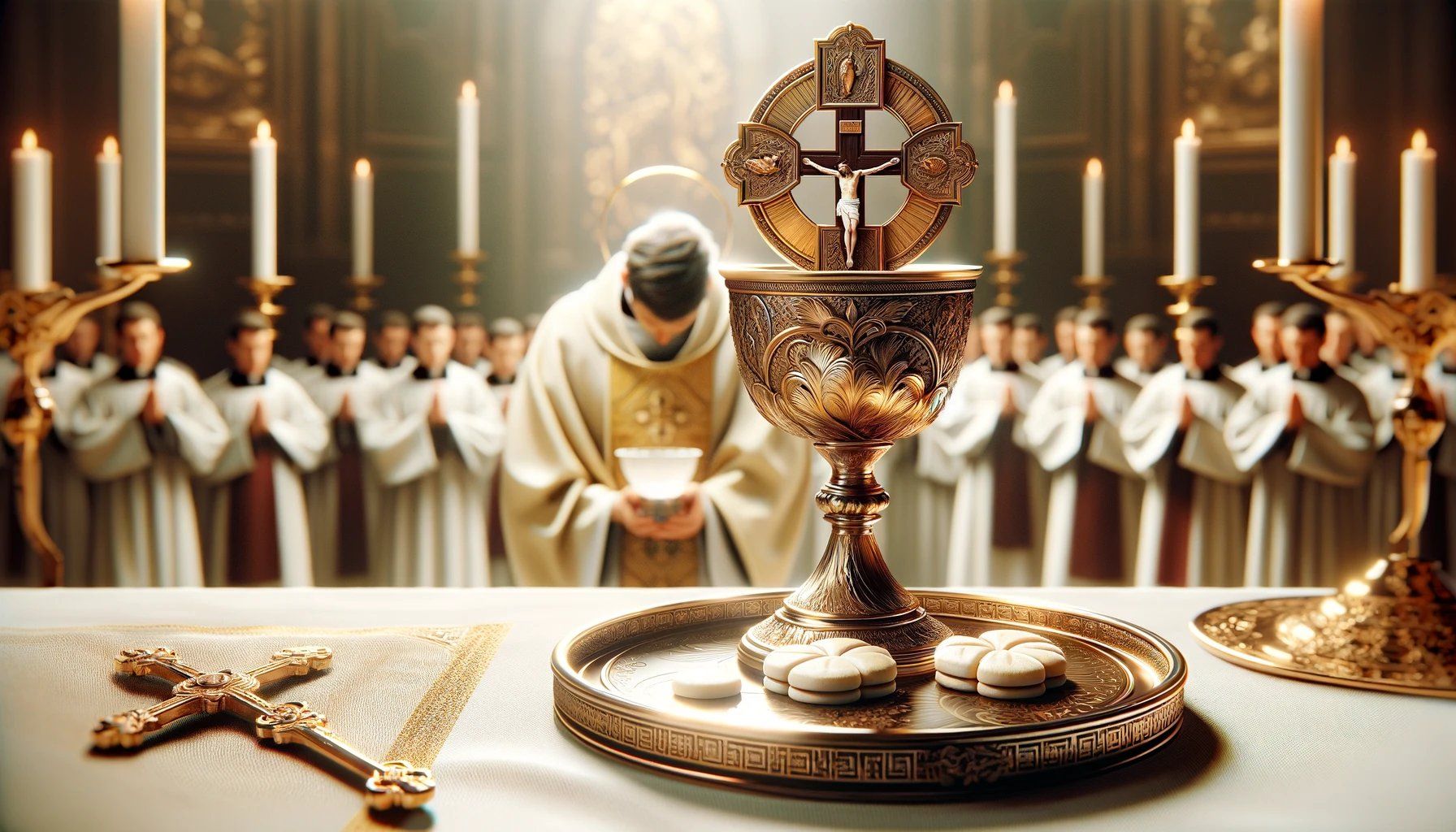Home>Theology and Spirituality>Who Can Take Communion In The Catholic Church


Theology and Spirituality
Who Can Take Communion In The Catholic Church
Published: February 25, 2024
Ericka Andersen, an editor at Christian.net, expertly merges digital strategy with content creation, focusing on faith and societal issues. Her communication skills enhance the platform's engaging narratives, fostering meaningful dialogue on belief's impact on society.
Discover the guidelines for receiving communion in the Catholic Church. Learn about the theology and spirituality behind this sacred practice.
(Many of the links in this article redirect to a specific reviewed product. Your purchase of these products through affiliate links helps to generate commission for Christian.net, at no extra cost. Learn more)
Table of Contents
Introduction
Communion, also known as the Eucharist, holds profound significance in the Catholic Church. It is a sacred sacrament that symbolizes the unity of believers with Christ and with one another. The act of receiving Communion is a deeply spiritual and communal experience, representing the nourishment of the soul and the bond of faith among the faithful.
In the Catholic tradition, Communion is not merely a symbolic ritual; rather, it is believed to be the actual body and blood of Jesus Christ. This belief, known as transubstantiation, underscores the sacred nature of the Eucharist and its centrality in the life of a Catholic believer. The act of receiving Communion is a solemn and reverent practice, steeped in centuries of tradition and theological significance.
Understanding the Catholic Church's view on Communion requires delving into the rich tapestry of its teachings and traditions. It is a sacrament that embodies the essence of the Catholic faith, serving as a source of spiritual nourishment and a tangible expression of unity within the Church. As such, the guidelines and requirements for receiving Communion are carefully delineated to uphold the sanctity of this sacred rite.
In the subsequent sections, we will explore the Catholic Church's perspective on Communion, the prerequisites for partaking in this sacrament, and the individuals who are deemed eligible to receive the Eucharist. Additionally, we will delve into the implications of excommunication and its impact on one's ability to participate in the Communion ritual. Through this exploration, we aim to illuminate the profound significance of Communion within the Catholic faith and the reverence with which it is approached by the faithful.
Read more: Who Can Take Communion In A Baptist Church
Understanding the Catholic Church's view on Communion
The Catholic Church's perspective on Communion is deeply rooted in its theological and sacramental teachings. Central to this view is the belief in the real presence of Jesus Christ in the Eucharist, a concept known as transubstantiation. According to Catholic doctrine, during the celebration of the Eucharist, the bread and wine become the actual body and blood of Christ, while retaining the appearance of bread and wine. This profound understanding of the Eucharist sets it apart as a sacred and transformative sacrament within the Catholic faith.
The Catechism of the Catholic Church elucidates the significance of the Eucharist, emphasizing its role as the "source and summit of the Christian life." It is considered the pinnacle of worship and a means of encountering the living Christ in a tangible and intimate manner. Through the reception of Communion, Catholics believe they are united with Christ and nourished spiritually, strengthening their bond with the Church and fellow believers.
Furthermore, the Catholic Church views Communion as a communal act, emphasizing the unity of the faithful in partaking of the Eucharist. This communal dimension underscores the interconnectedness of believers within the body of Christ, fostering a sense of solidarity and shared faith. The Eucharist is not merely an individual experience but a collective expression of the Church's unity and shared identity as the people of God.
In addition to its spiritual significance, the Catholic Church regards the Eucharist as a sacrificial memorial of Christ's passion, death, and resurrection. This sacrificial aspect harks back to the Last Supper, where Jesus instituted the Eucharist, commanding his disciples to "do this in memory of me." Thus, Communion is intricately linked to the redemptive sacrifice of Christ, serving as a continual remembrance and participation in the saving work of Jesus.
The Catholic Church's view on Communion encompasses profound theological, spiritual, and communal dimensions, reflecting its centrality within the faith. It is a sacrament that encapsulates the core tenets of Catholic belief, serving as a tangible expression of the real presence of Christ, the unity of believers, and the sacrificial nature of redemption. This understanding forms the bedrock of the Catholic Church's reverence for the Eucharist and informs the guidelines for its reception by the faithful.
Requirements for receiving Communion in the Catholic Church
Receiving Communion in the Catholic Church is a sacred and revered practice, accompanied by specific requirements that uphold the sanctity of the Eucharist. The Catholic Church has established guidelines to ensure that individuals approach the reception of Communion with reverence, understanding, and spiritual preparedness.
1. Baptism and Confirmation
One of the primary requirements for receiving Communion in the Catholic Church is being baptized and, if applicable, confirmed in the faith. Baptism is the sacrament that initiates individuals into the Christian faith, marking their incorporation into the body of Christ. Confirmation, which often follows baptism, strengthens and seals the grace received at baptism, empowering individuals with the gifts of the Holy Spirit. These sacraments lay the foundation for active participation in the Eucharist, signifying a commitment to the beliefs and practices of the Catholic Church.
2. State of Grace
According to Catholic teaching, individuals must be in a state of grace to receive Communion. This entails being free from mortal sin, which is a grave offense against God's law. Catholics are encouraged to participate in the sacrament of reconciliation, also known as confession, to seek forgiveness for serious sins and reconcile with God and the Church. By confessing their sins and receiving absolution, individuals can restore their state of grace, making them eligible to partake in the Eucharist.
3. Fasting and Preparation
The Catholic Church prescribes fasting before receiving Communion as a sign of reverence and spiritual preparation. The Code of Canon Law specifies that the faithful should abstain from food and drink, with the exception of water and medicine, for at least one hour before receiving the Eucharist. This period of fasting is intended to foster a spirit of self-discipline and attentiveness, allowing individuals to approach the reception of Communion with a focused and reverent disposition.
4. Understanding of the Eucharist
A fundamental requirement for receiving Communion in the Catholic Church is a genuine understanding and belief in the nature of the Eucharist. Individuals are encouraged to embrace the Church's teachings on the real presence of Christ in the Eucharist, acknowledging the sacred mystery and significance of this sacrament. A deep reverence for the Eucharist as the body and blood of Christ is essential in approaching Communion with the appropriate reverence and faith.
5. Participation in the Mass
Lastly, active participation in the Mass, where the Eucharist is celebrated, is integral to receiving Communion. Attending the liturgy, engaging in the prayers and rituals, and uniting with the faith community in worship are essential components of preparing to receive the Eucharist. The communal aspect of the Mass underscores the interconnectedness of believers and the shared experience of encountering Christ in the Eucharist.
In summary, the requirements for receiving Communion in the Catholic Church encompass baptism and confirmation, a state of grace, fasting, understanding of the Eucharist, and active participation in the Mass. These prerequisites reflect the Church's emphasis on spiritual readiness, reverence, and active engagement with the sacramental life of the faith community. Adhering to these requirements ensures that the reception of Communion is approached with the solemnity and devotion befitting this central sacrament of the Catholic Church.
Who is allowed to take Communion in the Catholic Church
In the Catholic Church, the eligibility to receive Communion is guided by specific criteria that reflect the sacred nature of the Eucharist and the Church's teachings. The following individuals are considered eligible to partake in the reception of Communion:
1. Baptized Catholics
Baptized Catholics who have received the sacrament of Confirmation and are in a state of grace, free from mortal sin, are permitted to receive Communion. The sacraments of baptism and confirmation establish a foundation of faith and spiritual readiness, enabling individuals to actively participate in the Eucharistic celebration.
2. Those in a State of Grace
Individuals who have confessed their sins and sought reconciliation through the sacrament of confession are deemed eligible to receive Communion. Being in a state of grace, characterized by the absence of serious sin, is a prerequisite for approaching the Eucharist with reverence and spiritual purity.
3. Non-Catholic Christians in Certain Circumstances
In exceptional cases, non-Catholic Christians who share the Catholic Church's belief in the Eucharist as the body and blood of Christ and are in a state of grace may be allowed to receive Communion. This allowance is typically extended to individuals from Eastern Orthodox churches or other Christian denominations with a valid understanding of the Eucharist's significance.
4. Children Receiving First Holy Communion
Children who have undergone preparation for their First Holy Communion, usually around the age of seven or eight, are permitted to receive the Eucharist for the first time. This significant milestone in their faith journey marks their initiation into the sacramental life of the Church and their participation in the Communion ritual.
Read more: Who Can Take Communion In An Anglican Church
5. The Sick and Homebound
Individuals who are ill, homebound, or hospitalized are eligible to receive Communion through the ministry of the Eucharist. This outreach ensures that those unable to attend Mass due to health reasons can still partake in the spiritual nourishment and grace offered by the Eucharist.
6. Those in Danger of Death
In situations where individuals are in imminent danger of death, the Church allows for the reception of Communion as a source of spiritual comfort and sustenance in their final moments.
The Catholic Church's guidelines regarding the eligibility to receive Communion reflect its commitment to upholding the sanctity of the Eucharist while also extending pastoral care and spiritual support to the faithful in various life circumstances. These criteria serve to ensure that the reception of Communion is approached with reverence, faith, and a deep understanding of its significance within the Catholic tradition.
Excommunication and its impact on receiving Communion
Excommunication, a severe ecclesiastical penalty in the Catholic Church, has profound implications for an individual's participation in the sacraments, including the reception of Communion. When a person is excommunicated, they are effectively separated from the Church and its sacramental life due to grave and deliberate violations of Church law or doctrine. This exclusion from the faith community carries significant spiritual and communal consequences, particularly regarding the reception of the Eucharist.
The impact of excommunication on receiving Communion is unequivocal. An individual who has been excommunicated is prohibited from receiving the Eucharist, as well as the other sacraments, until the excommunication is lifted or absolved through the sacrament of reconciliation. This exclusion stems from the understanding that excommunication signifies a rupture in the individual's communion with the Church, necessitating a period of repentance, reconciliation, and potential restoration to full participation in the sacramental life of the Church.
Excommunication serves as a form of spiritual discipline and a call to repentance, emphasizing the gravity of the individual's actions and their impact on the unity and integrity of the Church. It is intended to prompt reflection, contrition, and a genuine desire for reconciliation with God and the faith community. During this period of exclusion, the individual is encouraged to seek reconciliation with the Church, address the underlying issues that led to the excommunication, and undertake steps toward spiritual renewal and amendment of life.
The impact of excommunication on receiving Communion underscores the Church's commitment to upholding the sanctity of the Eucharist and the integrity of its sacramental life. It serves as a safeguard against the unworthy reception of the Eucharist and emphasizes the importance of spiritual readiness, repentance, and reconciliation within the faith community. The process of lifting excommunication and restoring the individual to full communion with the Church entails a deliberate and pastoral approach, guided by the principles of mercy, justice, and the restoration of the individual's relationship with God and the Church.
In summary, excommunication profoundly affects an individual's ability to receive Communion, reflecting the Church's stance on the sacredness of the Eucharist and the spiritual implications of exclusion from the faith community. It underscores the Church's commitment to upholding the integrity of the sacraments while also extending the possibility of reconciliation and restoration to those who seek to mend their relationship with the Church and God.
Conclusion
In conclusion, the Catholic Church's perspective on Communion is deeply rooted in its theological richness and sacramental significance. The Eucharist, as the central sacrament of the Catholic faith, embodies the real presence of Jesus Christ and serves as a profound expression of unity, spiritual nourishment, and communal worship within the Church. The requirements for receiving Communion in the Catholic Church, including baptism, confirmation, a state of grace, fasting, understanding of the Eucharist, and active participation in the Mass, underscore the reverence and spiritual preparedness essential for partaking in this sacred ritual.
The eligibility to receive Communion in the Catholic Church encompasses baptized Catholics, individuals in a state of grace, non-Catholic Christians in certain circumstances, children receiving First Holy Communion, the sick and homebound, and those in danger of death. These criteria reflect the Church's commitment to fostering spiritual inclusion and pastoral care while upholding the sanctity of the Eucharist.
Furthermore, the impact of excommunication on receiving Communion underscores the Church's unwavering dedication to preserving the integrity of the sacraments and the spiritual well-being of the faithful. Excommunication serves as a call to repentance and reconciliation, emphasizing the gravity of actions that disrupt the individual's communion with the Church and the need for spiritual renewal and restoration.
Ultimately, the Catholic Church's view on Communion, its requirements for reception, and the implications of excommunication collectively highlight the sacredness of the Eucharist and the profound significance it holds within the faith community. It is a sacrament that encapsulates the essence of Catholic belief, serving as a tangible expression of the real presence of Christ, the unity of believers, and the redemptive sacrifice at the heart of the Christian faith. As such, the reception of Communion is approached with reverence, faith, and a deep understanding of its transformative power within the Catholic tradition.












